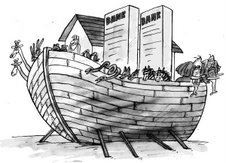Century Marks

A book a day: Beginning in October 2008 Nina Sankovitch read a book a day for an entire year. Her discipline was to read only books she hadn’t read before and only one book per author. Each morning she would post a review of the previous day’s book at her Web page (readallday.org). The project began as effort to cope with the death of her older sister. To maintain her pace, the former environmental lawyer, now a stay-at-home wife and mother of three, gave up gardening, clothes shopping and coffee klatches with friends (New York Times, October 12).
Honoring the difference: In considering the hostile language toward “the Jews” found in John’s Gospel, Jewish scholar Adele Reinhartz poses some challenging questions to Christians: “Can we be so bold as to reject some aspects of our Scriptures as ‘ungodly’? Is the valuing of a sacred Scripture an all or nothing proposition? Do we read [Scriptures] in ways that serve only to accentuate the gulf between ourselves and others, or do we find ways to read them so as to honor rather than despair of the differences among us?” (Interpretation, October).
Excised text: Andy Schlafly, founder of the online Conservative Bible Project and son of activist Phyllis Schlafly, wants to make some changes to the biblical text. He wants to excise Jesus’ statement about snake handling and remove the story about Jesus preventing the woman caught in adultery from being stoned. The latter story is “a liberal addition, put in by people who wanted to undermine the reality of hell and judgment,” says Schlafly. He also would add a gloss to Jesus’ statement about it being “easier for a camel to go through the eye of a needle than for a rich man to enter into the kingdom of God.” Schlafly would change “rich man” to “a man who cares only for money” (Tennessean, October 18).
E pluribus unum: Parker Palmer says he despairs when he considers economic injustice in the U.S. and the country’s murderous misadventures abroad. But he acknowledges that the things that make him despair may make others glad. And therein lies the challenge to American democracy: respecting the radically different notions people have about the common good while working toward the common good—living out the national motto, e pluribus unum. “Simultaneously affirming the claims of community and the rights of individuals is no walk in the park, but democracy demands it,” said Palmer, who is writing a book on American democracy (couragerenewal.org).
Our common lot: Ethicist Daniel Callahan asks why it is that the U.S. is the only developed country that doesn’t provide universal health-care insurance. One reason is that Americans don’t have a strong tradition of thinking about the common good. Conservatives endorse choice, freedom and competition—but liberals don’t have a consensus on a countervailing set of values. “Suffering, disease, and death are our common lot,” argues Callahan. “They ought to be dealt with as our common problem . . . in the recognition that we all have bodies that go awry and fail” (Commonweal, October 9).
Atheism schism: A rift is growing in the atheist community (see news story in this issue). On the one side are the militant “new atheists” like Christopher Hitchens, who claim that religion should be treated “with ridicule, hatred and contempt.” On the other side are old school atheists like Paul Kurtz, who founded the Center for Inquiry 30 years ago to provide an alternative to religion. Kurtz builds alliances with religious groups on issues like addressing climate change and opposing the teaching of creationism in public schools. Kurtz says he was ousted as director of the center in a “palace coup” a year ago. “I consider them atheist fundamentalists,” Kurtz says of his atheist opponents (“Morning Edition,” October 19, NPR).
Listening to illness: Physicians are apt to spend more time studying their patients’ records on a computer than listening to the patients themselves. The economic pressure on medical professionals is also crowding out time for patients. And yet a patient’s own narrative of his or her illness is as important as any DNA analysis or MRI investigation, says Dr. Jerome E. Groopman. “The most seasoned clinicians teach that the patient tells you his diagnosis if only you know how to listen.” What is being lost is the “compassionate, altruistic core of medical practice,” Groopman says (New York Review of Books, November 5).
Exploiting Marge: The November issue of Playboy magazine bearing an image of a seminude Marge Simpson, the matriarch of the cartoon family The Simpsons, has upset the American Family Association. It doesn’t matter that Marge Simpson is not really nude and is just a cartoon figure. “A cartoon is going to be appealing to a child,” says a spokesperson for AFA, which calls itself “an outspoken, resolute, Christian voice” (RNS).
Wacky world: Jimmy Akesson, a Swedish politician, believes that Muslims represent the “greatest external threat” to Swedes since World War II. He blames Muslim men for rapes in Europe and alleges that at least ten Muslim terrorist groups operate in Sweden. . . . Nation of Islam leader Louis Farrakhan thinks that the H1N1 vaccine was developed to kill people. He went on to voice the attitude that he believes is behind the purveyors of the vaccine: “The Earth can’t take 6.5 billion people. We just can’t feed that many. So what are you going to do? Kill as many as you can” (UPI).





